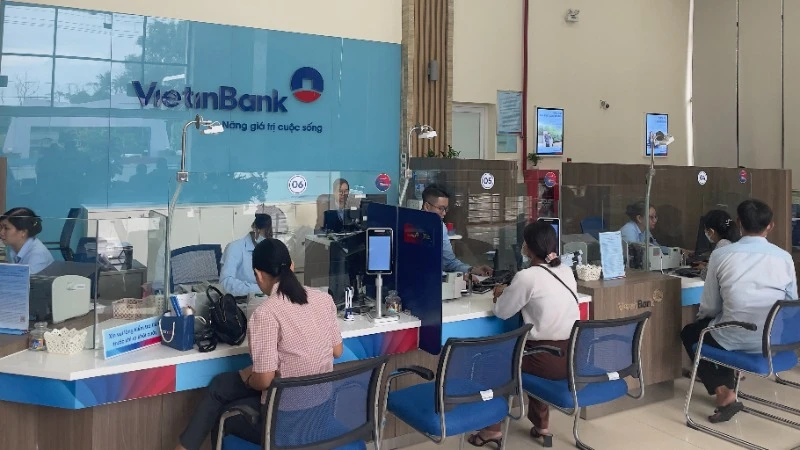Contribute to preventing cross ownership
The amended Law on Credit Institutions (Law on Credit Institutions) passed by the National Assembly on January 18, 2024 will officially take effect from July 1, 2024. With many new points, the Law is expected to create strong changes, helping the operations of the credit system to be smoother, more transparent and bring many new values to financial and credit activities in the coming time.
According to Article 63 of the Law on Credit Institutions, the maximum ownership ratio for individual shareholders is determined at 5%, but for institutional shareholders, it is reduced from 15% to 10% of the charter capital of a credit institution, and for shareholders and related persons, it is reduced from 20% to 15% of the charter capital of a credit institution.
According to Associate Professor Dr. Tran Hung Son, lecturer at the Faculty of Finance and Banking, University of Economics and Law, Ho Chi Minh City National University, regulations on share ownership ratios in banks will help limit bank takeovers and better protect small shareholders.
According to Dr. Huynh Trung Minh, a banking and finance expert, when the ownership ratio decreases, the ability of shareholders to influence and control the bank will decrease, helping to limit the risk of financial manipulation and corruption. At the same time, it contributes to the transparency of the financial system because if shareholders have a large ownership ratio, they can rely on it to make decisions that create group and personal interests.
In addition, when cross-ownership is prevented, supervision of banking activities will become clearer and more effective, helping management agencies to better control.

Attorney Le Cao, Managing Attorney of FDVN Law Firm.
Lawyer Le Cao, Managing Lawyer of FDVN Law Firm, commented that with the above regulations, economic organizations investing in and controlling banks will gradually have to withdraw capital, reducing their influence in banks through capital dominance.
Legally, the impact of reducing the ownership ratio like this is to avoid the possibility of businesses manipulating and taking over banks, and is a legal solution to prevent businesses and individuals from using banks as a backyard to arbitrarily transfer cash flow and use banks to serve businesses.
When the law stipulates, controlling capital contribution activities also increases the ability to control capital sources and businesses investing in banks, making more cash flow into business activities, in legal theory, it is trying to reduce cross-ownership in banks.
“However, in reality, there are individuals and businesses that, although owning very little capital in banks, somehow, through people who are not related or legally related, they help manipulate banks, which is an issue that needs to be controlled during operations.
For example, individuals and businesses themselves comply with the share ownership ratio, but they will still have "strangers" who are legally "acquaintances" in real life who stand in their names, collect shares, control and manipulate.
Therefore, there needs to be legal control solutions so that regulations on ownership ratios are complied with in practice. Otherwise, cross-ownership will still take place secretly and bank manipulation will still occur," said Lawyer Le Cao.
Banning the activity of "selling beer with peanuts"
In addition, according to Clause 5, Article 15 of the Law on Credit Institutions, the actions of credit institutions, foreign bank branches, managers, operators, and employees of credit institutions and foreign bank branches must not link the sale of non-compulsory insurance products to the provision of banking products and services in any form.
Lawyer Le Cao said that this regulation will limit the association of insurance with banks to force borrowers to borrow money. Currently, many banks have cooperation, or the banks themselves or bank owners are also shareholders owning capital in insurance companies, so the connection of interests between insurance companies is even tighter, leading to "forcing" customers to both lend capital and sell insurance.
In recent years, the strategy of "beer with peanuts" causing trouble and forcing customers has led to people's attitude towards insurance products that come with credit contracts being very dissatisfied. The law has strict regulations that will separate credit granting activities from insurance business activities, which will make the insurance market transparent and avoid causing trouble for people.

Dr. Huynh Trung Minh, banking and finance expert.
However, according to Mr. Huynh Trung Minh, this will greatly affect banking operations, especially reducing revenue from insurance business. It will force banks to restructure products and product portfolios to compensate for lost income when revenue from insurance channels is limited.
Insurance companies are greatly affected by the proportion of new premium revenue through insurance distribution activities through banks (Bancassurance) which currently accounts for a higher proportion than traditional insurance premium revenue. The fact that banks are not allowed to sell certain types of insurance will significantly reduce new premium revenue from bancassurance of insurance companies.
Not to mention, the customer segment that buys insurance through banks is currently very selective, completely different from the traditional channel. Therefore, the customer portfolio that insurance companies get from selling insurance through banks will certainly decrease significantly.
In addition, prohibiting credit institutions from linking the sale of non-compulsory insurance products with the provision of banking products and services in any form also affects the relationship between customers and banks.
“If previously banks operated like “financial supermarkets”, able to provide a variety of convenient products and services, now customers in need may have to go to other insurance companies to buy products, reducing the convenience and customer satisfaction with the bank’s services,” Mr. Minh stated his opinion.
A new wind for credit activities
In general, when evaluating the revised Law on Credit Institutions, experts all stated that the Law on Credit Institutions 2024 will have a great impact on credit activities in the coming time.
Lawyer Le Cao said that the Law has many progressive provisions related to reducing administrative procedures for licensing, clearly defining the process of organizing activities, applying technology and adapting to new electronic transaction activities in the operations of credit institutions.
Those innovations, when implemented in practice, will create a new wind for credit activities and are expected to effectively control credit activities so that the cash flow in the economy is transparent and has the energy to promote economic development.
According to Mr. Son, the Law on Credit Institutions will aim to increase transparency and safety in the operations of the banking system and banks will also have time to prepare before the law takes effect.
However, it should be noted that monitoring compliance with regulations is even more important, so the State Bank of Vietnam (SBV) needs to regularly measure compliance levels to detect signs of violations and avoid violations of regulations in recent operations.

The State Bank needs to regularly measure compliance levels to detect signs of law violations.
Lawyer Le Cao pointed out that currently, illegal activities at banks have unpredictable changes with different types of behavior, not only violations in banking operations but also violations related to the economic system, so management supervision is an important and complicated issue.
In general, the supervision and management of focal points must of course be the responsibility and authority of the State Bank to have a unified focal point, avoiding many points of blame and denial of responsibility.
However, it is also necessary to create a coordination mechanism so that when other agencies detect or have coordinated solutions to promptly prevent and monitor banking activities. There should be regulations on cross-checking, independent reporting and a monitoring mechanism from people, businesses and other agencies. According to specific findings, the State Bank must be transparent and public about the inspection when there are results.
Regulations on the monitoring process also need to be implemented in a systematic manner, avoiding cases where inspectors conduct inspections but cover up violations. The legal system also needs a mechanism to regularly check, cross-monitor, and supervise the monitoring so that the monitoring is not a factor of negative corruption .
Source: https://www.nguoiduatin.vn/luat-cac-tctd-sua-doi-quan-trong-nhat-la-tuan-thu-quy-trinh-giam-sat-a668688.html






![[Photo] Prime Minister Pham Minh Chinh and Brazilian President Luiz Inácio Lula da Silva attend the Vietnam-Brazil Economic Forum](https://vstatic.vietnam.vn/vietnam/resource/IMAGE/2025/3/29/f3fd11b0421949878011a8f5da318635)

























![[Photo] Brazilian President visits Vietnam Military History Museum](https://vstatic.vietnam.vn/vietnam/resource/IMAGE/2025/3/29/723eb19195014084bcdfa365be166928)




























































Comment (0)